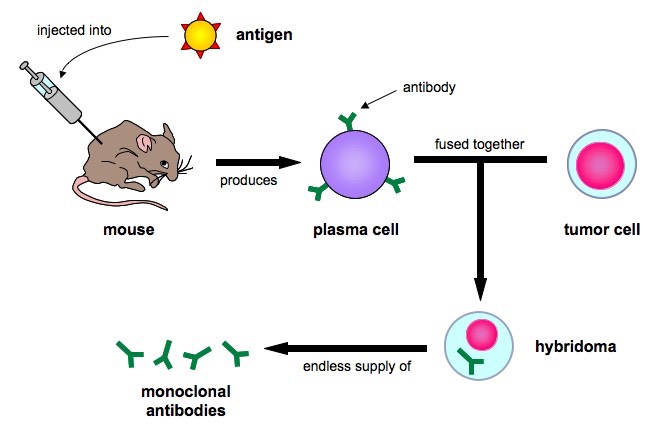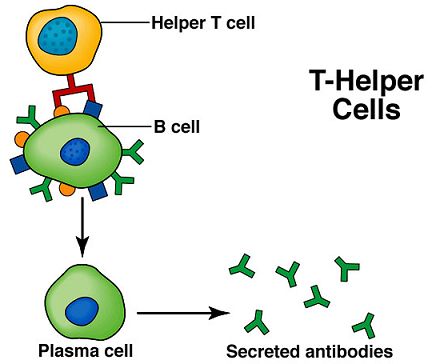Production Of Antibodies By Plant Cells And Organs
Small piece of a disease-causing organism or other substance that triggers the production of antibodies by the immune system. Each B cell lymphocyte produces one unique antibody against one unique epitope.
Immune System Antibody Tissue Rejection Biology Notes For Igcse 2014
The growing interest in R.
Production of antibodies by plant cells and organs. Antigens include bacteria cells of transplanted organs plant pollen and toxins. Cells that can create the specialized cells that make up tissues and organs. Organs are the site where the cells of the immune system either mature or interact with the antigen.
Organs of the Immune System. Metabolic engineering is possibly the most straightforward strategy to boost pharmaceutical production in plant biofactories but social. Since this initial demonstration over 20 different recombinant proteins have been produced in plant cell.
Plasma cells create antibodies specific to a certain antigen. Like animals plants contain cells with organelles in which specific metabolic activities take place. When B cells become activated due to the presence of a particular antigen they develop into plasma cells.
Although there were several disadva. There are few reports of ruscogenin production in in vitro cultures of R. According to the protein specificities recognized by the individual antibodies.
To validate the ability of the 61 monoclonal antibodies to detect floral proteins and examine their specificity for particular proteins we performed WB assays using total proteins extracted from Arabidopsis leaves stems and inflorescences. Organs of the immune system are classified into two types. Plant cell size can be reduced by increasing the osmolality of the culture medium to shrink the vacuole resulting in higher cell numbers at the same PCV but even then plant cells remain much larger than both mammalian cells and bacteria Vasilev et al 2013.
May be used for vaccination. They do not produce them directly. B cells develop from stem cells in bone marrow.
The form of tissue had a significant effect on antibody levels. Shooty teratomas were less productive than hairy roots or suspended cells. The first time that a new antigen comes into contact with the body the response of the immune system will be a complete immune response.
15-23 At around the same time the second community realized that although plants do not naturally produce antibodies against their viral bacterial and fungal pathogens they could be engineered to express such antibodies if the correct antibody. As discussed earlier there are various cells tissues and organs which are responsible for building an immune system in an organism. The latter offer advantages in terms of cost-effectiveness large-scale production and.
Antibodies are produced by a type of white blood cell called a B cell B lymphocyte. In addition plant cells have cell walls plastids and a large central vacuole. Recombinant or stably transformed plants and plant cell cultures have been applied for foreign protein production for about 20 years.
Interestingly these cannot only be produced in microorganisms eg Escherichia coli Bacillus subtilis and Saccharomyces cerevisiae or mammalian cell cultures Chinese hamster ovary or baby hamster kidney cells but also in plant callus cultures and in plant suspension cell cultures derived thereof. Antigens stimulate the production of antibodies. Tage of plant-produced antibodies might be the possibility of their glycoengineering and as a result the production of improved pharmaceutical proteins bio-betters.
Molecular farming in plants was considered by the pioneers as a way to address three major challenges associated with traditional platforms for antibody production based on microbes and animal cells. Structures that are not found in animal cells. Green structures in plant cells that capture the Suns energy to produce food for the cells.
Antigens include bacteria cells of transplanted organs plant pollen and toxins. Further-more if whole transgenic plants are used instead of cul-ture cells antibody production is only limited by land area and harvesting can be performed using existing agronomi-cal facilities Schillberg et al 2003. Testing Monoclonal Antibodies for Organ Specificity by Western Blot.
Vaccines are examples of antigens in an immunogenic form which are intentionally administered to a recipient to induce the memory function of the adaptive immune system towards antigens of the pathogen invading that. Shooty teratomas were less productive than hairy roots or suspended cells. Protein yield can also be enhanced by increasing the production volume.
Aculeatus saponins generated by these latest findings calls for alternative production systems such as biofactories based on plant cell and organ cultures. Unlike animals however plants use energy from sunlight to form sugars during photosynthesis. Antigens stimulate the production of antibodies.
They do not produce them directly. Plants and plant tissue cultures are used as host systems for expression of foreign proteins including antibodies vaccines and other therapeutic agents. The form of tissue had a significant effect on antibody levels.
Abstract Various strategies aimed at improving IgG 1 antibody accumulation in transgenic tobacco cell and organ cultures were tested. The first recombinant protein produced in plant cells was reported nearly 15 years ago 3. Safety scalability and cost.
Various strategies aimed at improving IgG1 antibody accumulation in transgenic tobacco cell and organ cultures were tested. Once antibodies with sufficient specificity to the epitope can be encoded the B cell begins to release antibodies. Plant biofactories are biotechnological platforms based on plant cell and organ cultures used for the production of pharmaceuticals and biopharmaceuticals although to date only a few of these systems have successfully been implemented at an industrial level.

Monoclonal Antibodies Bioninja

Polyclonal And Monoclonal Antibody Production Microbiology

Antibodies From Plants For Bionanomaterials Edgue 2017 Wires Nanomedicine And Nanobiotechnology Wiley Online Library

Immune System Antibody Tissue Rejection Biology Notes For Igcse 2014